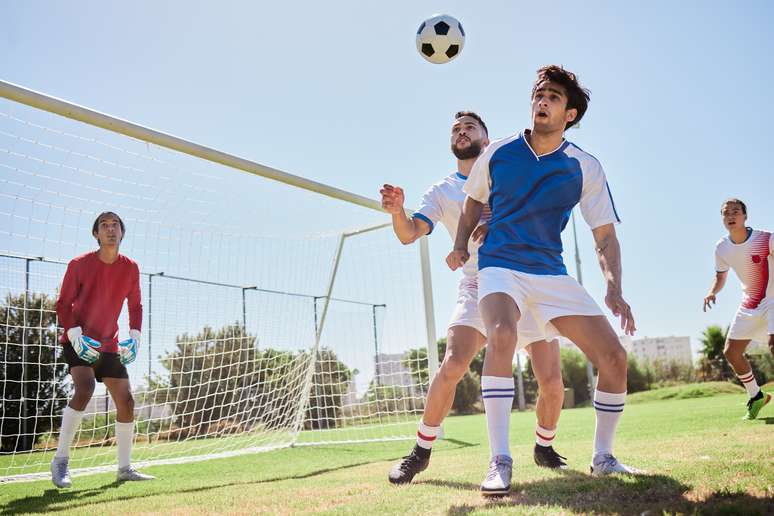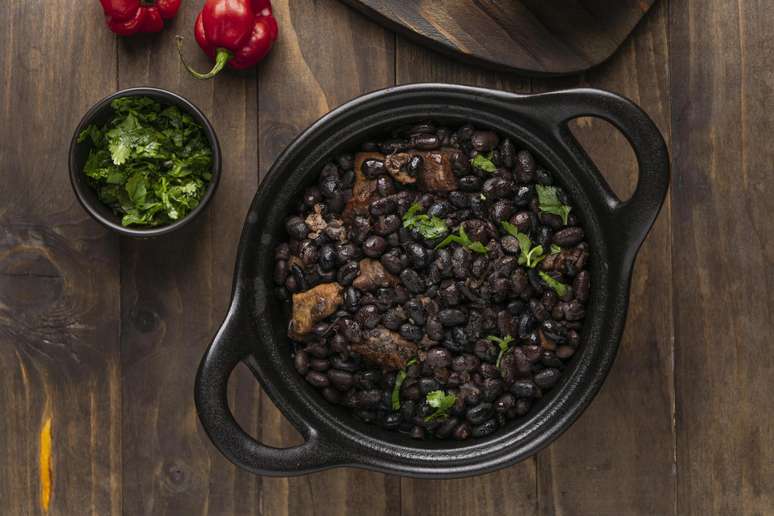Experts suggest what to eat or avoid before, during and after matches
Do you usually play football with your friends every weekend, just for fun? Or are you serious about this hobby? Whatever your relationship with sport, know that some tips can improve your well-being and even your performance in the game. After all, no one wants to do harm, even if the game is only for amateurs.
1. Give time to digestion
One of the first rules concerns meal times. For sports medicine specialist Victor Lamônica, a full stomach is not suitable for sport. “The ideal would be to wait at least three hours after a lunch or dinner containing animal proteins (eggs, meat, fish or chicken). And after 40 minutes or an hour, if it is a meal containing only foods of vegetable. This difference is due to the fact that plant proteins are absorbed more quickly than those of animal origin”, he explains.
It says that much of the blood will go to the muscles and brain, so you can run, kick, test, fall, get up, pay attention, or focus on that movement. Crossing, thinking about where to go, where to kick. Ultimately, making you “fight”. “This way, the escape system, or sympathetic system, becomes overactivated, causing the food in your stomach to remain undigested, making you feel heavy and putting you at risk of becoming unwell while playing.”
2. Respect your needs
Nutritionist Marcella Garcez says that there are people who play well during a football match that lasts up to 90 minutes without eating well beforehand, just taking care of their hydration, and feel good, while others, if they don’t eat anything, can feel sick. . “Therefore it is important to know the particularities of your body.” But it is important that the meal before departure is light. After the match it is then possible to replenish all the needs of carbohydrates, proteins, fats and water based on the intensity of the activity.
As for playing at night after eating, nutritionist Betina Santos, specialized in clinical and sports nutrition and representative of the Tia Sônia brand, says that it all depends on what each person considers dinner to be. “If it’s a ‘heavier’ meal, it actually takes the body longer to absorb and send energy (glucose, sugar) into the blood,” he says.
3. Focus on the right foods
What would be the most recommended foods for practitioners? Lamônica lists fruit, oats, coffee without sugar or at most sweetener. He says many don’t know this, but certain types of fats are extremely effective in pre-workouts, providing energy quickly and easily. In this sense he cites the MTC (Medium chain triglyceridesEnglish term for medium chain triglycerides), which can be used together with coffee, for example, giving its name to a well-known drink called “bulletproof”.
“This drink is nothing more than a coffee with TCM. A great option 30-45 minutes before the match. And to maintain a more adequate blood glucose level during the match, without causing insulin spikes, add palatinose, a low glycemic index carbohydrate that promotes a gradual release of energy, avoiding insulin spikes and prolonging the body’s energy supply”, says the doctor.
For Betina, the recommended foods are those considered sources of complex carbohydrates, rich in fiber, which are converted into glucose more slowly, providing energy levels that are maintained throughout the day: sweet potatoes, couscous, cassava and even a fruit with bran of oats and flax seeds. Stuffed tapioca or chia is also a good option.
“Those who need to eat before departure, but know that digestion is more difficult, should opt for easy alternatives such as dried fruit or nuts, which have a smaller volume and offer a greater amount of energy per portion,” explains Marcella .
For those who are hungry if they don’t eat before aerobic physical activity, he suggests some pairings: “Yogurt with granola, banana with oats, wholemeal bread sandwich with peanut butter and sugar-free jelly, and beetroot, orange, apple and Chia juice they are great pre-workout options. All great light meals, easy and slow to digest thanks to the presence of fibre, and the juice has characteristics that help improve performance and maintain satiety,” he adds.
4. Sachets can give you a boost
During sporting activity Lamônica reminds you that, in addition to drinking water, consuming salts brings benefits. “They come in sachets, or you can put a teaspoon of pink salt, or Himalayan salt, or any salt in a bottle. in naturebut not refined,” he recommends.
“After training, the foods that will replenish your energy are those used to restore glucose in the muscles. And the ones responsible for this action are carbohydrates. An effective post-workout, fast recovery, It is made up of a perfect combination of proteins and carbohydrates, in a 4:1 ratio, effective in recovering muscle glycogen and rebuilding muscles after high intensity physical activity.”
5. Avoid sweets and animal fats
It is also important to avoid certain foods before games. Marcella insists on the contraindication of sweets and snacks, as large quantities of foods with a high glycemic index, rich in sugar, can cause a rapid and unsustained peak in energy, leading immediately afterwards to a reduction in performance, with early tiredness.
It also warns about some foods that can cause discomfort during activity: “Foods with large amounts of fermentable fiber, bran, cabbage, broccoli, legumes such as beans and peas, in large quantities, can be difficult to digest and make it uncomfortable exercise,” he says.
Another tip from the nutritionist is to pay attention to foods rich in fats and proteins of animal origin, which are not recommended to consume immediately before playing a football match. “Therefore, fatty meats and cheeses should be avoided, as they require an intense digestive process, which can cause tiredness and fatigue even before the start of the match.”
6. Keep an eye out for symptoms
Marcella warns that any signs of physical discomfort that affect performance, such as pain, dizziness, nausea and other digestive disorders, are indicative of the need to take a break for observation and, at the very least, regulate body hydration.
Betina says that, typically, symptoms such as heartburn, nausea and dizziness appear when the person is not used to the routine of physical activity and the body is affected. “If the meal is not consumed in a balanced way, the body feels a lack of energy and can cause dizziness and nausea, among other signs. It is necessary to reinforce the diet with fruits, vegetables and legumes. If one of these symptoms occurs , it is necessary to suspend activity to avoid more serious damage to the body”, concludes the nutritionist.
Sources:
Betina Santos is a nutritionist, specializing in Clinical and Sports Nutrition. He also has a degree in Physical Education. At Tia Sônia he participates in product development.
Marcella Garcez is a nutritionist, Master in Health Sciences at the PUCPR School of Medicine, Director of the Brazilian Association of Nutrology and Professor of the institution’s National Nutrology Course.
Victor Lamonica has a postgraduate degree in Integrative Medicine; has a practice in Orthomolecular Medicine; Sports Medicine and Sports Nutrition.
Source: Terra
Ben Stock is a lifestyle journalist and author at Gossipify. He writes about topics such as health, wellness, travel, food and home decor. He provides practical advice and inspiration to improve well-being, keeps readers up to date with latest lifestyle news and trends, known for his engaging writing style, in-depth analysis and unique perspectives.



-1k25lxygpfiat.jpg)




